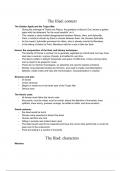The Iliad: context
The Golden Apple and the Trojan War:
- During the marriage of Thetis and Peleus, the goddess of discord, Eris, throws a golden
apple with the statement ‘for the most beautiful’ on it.
- This creates a vanity-fuelled disagreement between Athena, Hera, and Aphrodite.
- Paris, a mortal is chosen by Zeus to choose between them. He chooses Aphrodite.
- As his reward, Aphrodite promises him Helen, who is already married to Menelaus.
- In the taking of Helen by Paris, Menelaus calls for a war to take her back.
Homer, the composition of the Iliad, and literary techniques
- The identity of Homer is unclear. He is generally regarded as a blind bard, but may have
also been a woman, a group of poets, and added to over time.
- The Iliad is written in dactylic hexameter and spans 15,000 lines. It has a strong metre
and is meant to be played to music.
- There are no internal monologues, so speeches are used to express emotions.
- Similes: long extended similes are Homeric, and used to create vivid descriptions
- Epithets: create metre and help with memorisation. Characterisation is created.
Structure and plot:
- 24 books
- Linear structure
- Begins in media res in the tenth year of the Trojan War
- Serious tone
The Heroic code:
- all heroes must follow the heroic code
- Key points: must be noble, must be mortal, attract the attention of immortals, have
epithets, show mercy, possess courage, be skilled in battle, and show emotion.
Greek customs:
- the dead would be burnt
- Women were expected to lament the dead
- Human sacrifice was rare
- Killing in surprise was looked down upon
- The dead would need to be respected and have the correct rites performed or could not
pass over to the underworld
- Food and eating is a symbol of humanity
The Iliad: characters
Warriors
, - Aeneas: the second best Trojan warrior, cousin of Hector.
- Achilles: the greatest Greek warrior. Son of Thetis and Peleus.
- Agamemnon: the leader of the Greek warriors. Menelaus’ brother
- Andromache: Hector’s wife
- Antilochus: Nestor’s son, a young warrrior
- Astynax: Hector’s toddler son
- Briseis: a slave girl captured by Achilles as his prize
- Calchas: a Greek prophet
- Chryseis: the daughter of the prophet Chryses. Agamemnon’s prize
- Chryses: a priest of Apollo
- Deiphobus: one of Hector’s brother
- Diomedes: the greatest Greek warrior in the absence of Achilles.
- Glaucus: a strong Trojan warrior
- Hecabe: the wife of Priam and mother of Hector
- Hector: the greatest Trojan warrior. Son of Priam and Hecabe. Father of Astynax.
Brother of Paris.
- Helen: the cause of the war. Menelaus’ wife.
- Helenus: A Trojan seer
- Menelaus: the king of Greece, husband of Helen
- Nestor: an old man offering wisdom as he cannot fight. Greek.
- Odysseus: a Greek man skilled more in words than in battle
- Paris: the cause of the war.
- Patroclus: Achilles’ closest comrade
- Polydamus: a Trojan warrior
- Priam: the king of Troy
- Sarpedon: a son of Zeus
gods
- Zeus: the king of the gods. God of the sky.
- Athena: Zeus’ daughter. Goddess of wisdom and battle skills. Favours mainly Achilles,
Odysseus, and Diomedes
- Aphrodite: goddess of beauty and love. Favours Paris.
- Ares: god of war. Generally Trojan aligned.
- Hermes: god of travellers. Helps Priam.
- Apollo: god of music, healing, and archery. Favours the Trojans, mainly Hector.
- Iris: goddess of rainbows and messages. Neutral.
- Thetis: Achilles’ mother, a sea nympth
- Hephaestus: god of the forge. Helps Thetis help Achilles
The Iliad: book summaries
Book 1:




